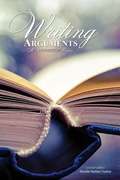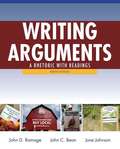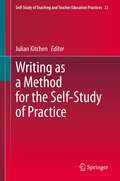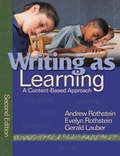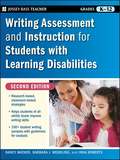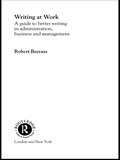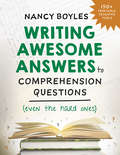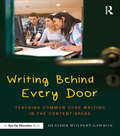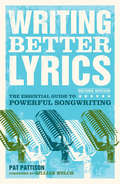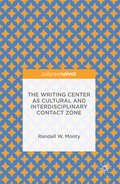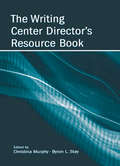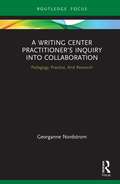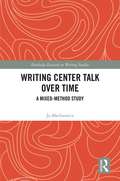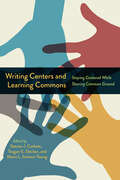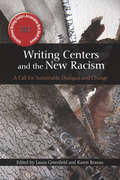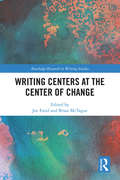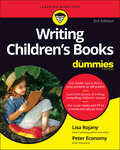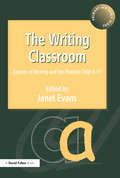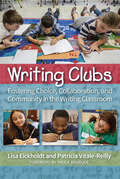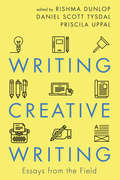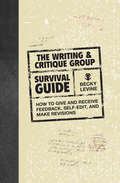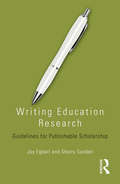- Table View
- List View
Writing Arguments: A Rhetoric And Reader
by Brenda Herbert HarkerA reading companion for both the teachers and the students as they pursue the argumentative writing course; equipped with essays with different styles selected for viewpoint and meaning.
Writing Arguments: A Rhetoric with Readings, Ninth Edition
by John D. Ramage John C Bean June JohnsonThe market-leading guide to arguments, Writing Arguments ,9/e has proven highly successful in teaching readers to read arguments critically and to produce effective arguments of their own.
Writing as a Method for the Self-Study of Practice (Self-Study of Teaching and Teacher Education Practices #23)
by Julian KitchenThis book focuses on the writing process in the self-study of teaching and teacher education practices. It addresses writing as an area in which teacher educators can develop their skills and represents how to write in ways that are compatible with self-study's orientations towards the inquiry, both personal and on practice. The book examines effective self-study writing with chapters written by experienced self-study practitioners. In addition to considering elements of writing as a method for the self-study of practice, it delves into the cognitive processes of real writers making explicit their writing practices. Practical suggestions are connected to the lived experiences of self-study practitioners making sense of their field through the process of writing. This book will be of interest to doctoral and novice self-study writers, and experienced authors seeking to develop their practice. It demonstrates that writing as a method of inquiry in self-study and beyond can be learned, modeled and taught.
Writing as Learning: A Content-Based Approach
by Andrew S. Rothstein Evelyn B. Rothstein Gerald LauberUsing 12 step-by-step strategies, teachers can help students build a rich vocabulary, gain a deep understanding of concepts, and develop organized thinking processes.
Writing Assessment and Instruction for Students with Learning Disabilities
by Nancy Mather Barbara J. Wendling Rhia RobertsIt Contains strategies for working with all students that struggle with writing, Offers classroom-tested strategies, helpful information, 100+writing samples with guidelines for analysis, and handy progress-monitoring charts, Includes ideas for motivating reluctant writers, Mather is an expert in the field of learning disabilities.
Writing at Work: A Guide to Better Writing in Administration, Business and Management
by Robert BarrassMany employers complain about the poor communication skills of many young people seeking employment; and many people in employment are handicapped by the poor quality of their written work. While bad spelling, ineffective punctuation and faults in grammar create barriers between the writer and the reader, good English makes the reader feel at ease.The benefits of being a good writer at work are:Managers need to be able to communicate in order to get ideas across. If they cannot, they will be unable to make their viewpoint heard and they will be unable to influence customers, suppliers and colleagues as desiredIf you can write well, you will find that your views are given prominence over those of others. Effective communication, and that includes writing, is the key to career success and advancementThis book is for those who have difficulty in getting thoughts into words or their ideas across, as well as those who are satisfied with their writing but are ready to consider the possibility of improving it. It is all about the ways in which writing at work is important - helping the reader to observe, remember, think, plan, organise and communicate.
Writing Awesome Answers to Comprehension Questions (Even the Hard Ones)
by Nancy BoylesHelp students appreciate texts and write about them with conviction. Responding to a comprehension question is a surprisingly complex task. It draws on multiple skills: students must be able to read and analyze a text passage; consider what aspect of the text the question addresses; and then quickly and concisely write about their ideas, citing evidence to support them. Hence the prominence of constructed-response questions in standardized testing. In this refreshingly clear and upbeat guide, literacy consultant Nancy Boyles gives a step-by-step demonstration of how to help students achieve success with this task—and in the process of unpacking the steps involved, demonstrates how the instruction can inspire teachers’ creativity as well as deepen students’ literacy skills. Filled with ready-to-use scaffolds for every stage of instruction—sets of sample questions, anchor charts, cue cards, answer frames—this is a one-stop resource for teaching students how to organize their thoughts about what they’ve read, and then set them down in writing.
Writing Behind Every Door: Teaching Common Core Writing in the Content Areas
by Heather Wolpert-GawronFor students to become college-ready writers, they must be exposed to writing throughout the school day, not just in English class. This practical book shows teachers in all subject areas how to meet the Common Core State Standards and make writing come alive in the classroom. Award-winning educator Heather Wolpert-Gawron provides effective and exciting ideas for teaching argument writing, informational writing, project-based writing, and writing with technology. Each chapter is filled with strategies, prompts, and rubrics you can use immediately. Special Features: A variety of writing strategies that work in any subject area Tips for developing meaningful prompts Diagrams and templates that you can use with your students Rubrics for assessing writing, as well as ideas for having students create their own rubrics Samples of student work in different formats Ideas for teaching students to break the Google homepage habit and conduct effective research Cross-curricular writing assignments for science, history, ELA, electives, and PE Suggestions for teaching summary writing, an essential academic skill Ideas for staff professional development on Common Core writing
Writing Better Lyrics Second Edition: Essential Guide To Lyric Form And Structure: Tools And Techniques For Writing Better Lyrics (Songwriting And Lyrics Ser.)
by Pat PattisonPattison presents a unique, in-depth approach to the process of lyric writing. Songwriters will examine 17 extraordinary songs and learn the distinct elements that make them so effective. Pattison then presents more than 30 lyric-writing exercises designed to achieve the same results. From generating lyric ideas and managing repetition to developing verses, it's all here. Songwriters will: find warm-up exercises that revolutionize songwriting imagery; use a rhyming dictionary and a thesaurus to generate ideas and find snappy rhyme; create meaningful metaphors and similes while avoiding cliches; develop verses by using or breaking conventional rules; experiment with point of view in every lyric to make a song stand out
The Writing Center as Cultural and Interdisciplinary Contact Zone
by Randall W. MontyWriting centers are complex. They are places of scholarly work, spaces of interdisciplinary interaction, and programs of service, among other things. With this complexity in mind, this book theorizes writing center studies as a function of its own rhetorical and discursive practices. In other words, the things we do and make define who we are and what we value. Through a comprehensive methodological framework grounded in critical discourse analysis, this book takes a closer look at prominent writing center discourses by temporarily shifting attention away from the stakeholders, work, locations, and scholarship of the discipline, and onto things--the artifacts and networks that make up the discipline. Through this approach, we can see the ways the discipline reinforces, challenges, reproduces, and subverts structures of institutional power. As a result, writing center studies can be seen a vast ecosystem of interconnectivity and intertextuality.
The Writing Center Director's Resource Book
by Christina Murphy Byron L. StayThe Writing Center Director's Resource Book has been developed to serve as a guide to writing center professionals in carrying out their various roles, duties, and responsibilities. It is a resource for those whose jobs not only encompass a wide range of tasks but also require a broad knowledge of multiple issues.The volume provides information on the most significant areas of writing center work that writing center professionals--both new and seasoned--are likely to encounter. It is structured for use in diverse institutional settings, providing both current knowledge as well as case studies of specific settings that represent the types of challenges and possible outcomes writing center professionals may experience. This blend of theory with actual practice provides a multi-dimensional view of writing center work.In the end, this book serves not only as a resource but also as a guide to future directions for the writing center, which will continue to evolve in response to a myriad of new challenges that will lie ahead.
A Writing Center Practitioner's Inquiry into Collaboration: Pedagogy, Practice, And Research (Routledge Research in Writing Studies)
by Georganne NordstromThis book presents a model of Practitioner Inquiry (PI) as a systematic form of empirical research and provides a rationale for its suitability within a writing center context. Exploring the potential of writing centers as pedagogical sites that support research, the book offers an accessible model that guides both research and practice for writing center practitioners, while offering flexibility to account for their distinct contexts of practice. Responding to the increasing call in the field to produce empirical “RAD” (replicable, aggregable, data-driven) research, the author explores Practitioner Inquiry through explication of methodology and methods, a revisitation of collaboration to guide both practice and research, and examples of application of the model. Nordstrom grounds this research and scholarship in Hawaiʻi’s context and explores Indigenous concepts and approaches to inform an ethical collaborative practice. Offering significant contributions to empirical research in the fields of writing center studies, composition, and education, this book will be of great relevance to writing center practitioners, anyone conducting empirical research, and researchers working in tutor professionalization, collaboration, translingual literacy practices, and researchmethodologies.
Writing Center Talk over Time: A Mixed-Method Study (Routledge Research in Writing Studies)
by Jo MackiewiczIn the last 15 to 20 years, writing centers have placed greater importance on tutor training, focusing on teaching tutors best practices in fostering student writers’ engagement and writing skills. Writing Center Talk over Time explores the importance of writing center talk and demonstrates the efficacy of tutor training. The book uses corpus-driven analysis and discourse analysis to examine the changes in writing center talk over time to provide a baseline understanding of the very heart of writing center work: the talk that unfolds between tutors and student writers. It is this talk that, at its best, motivates student writers to continue to improve their writing and scaffolds their learning and that makes tutors proud of the service that they provide. The methods and analysis of this study are intended to inform other researchers so that they may conduct further research into the efficacy of writing center talk.
Writing Centers and Learning Commons: Staying Centered While Sharing Common Ground
by Steven J. Corbett Teagan E. Decker Maria L. L. Soriano YoungWriting Centers and Learning Commons presents program administrators, directors, staff, and tutors with theoretical rationales, experiential journeys, and go-to practical designs and strategies for the many questions involved when writing centers find themselves operating in shared environments. The chapters comprehensively examine the ways writing centers make the most of sharing common ground. Directors, coordinators, administrators, and stakeholders draw on past and present attention to writing center studies to help shape the future of the learning commons and narrate their substantial collective experience with collaborative efforts to stay centered while empowering colleagues and student writers at their institutions. The contributors explore what is gained and lost by affiliating writing centers with learning commons, how to create sound pedagogical foundations that include writing center philosophies, how writing center practices evolved or have been altered by learning center affiliations, and more. Writing Centers and Learning Commons is for all stakeholders of writing in and across campuses collaborating on (by choice or edict), or wishing to explore the possibilities of, a learning commons enterprise. Contributors: Alice Batt, Cassandra Book, Charles A. Braman, Elizabeth Busekrus Blackmon, Virginia Crank, Celeste Del Russo, Patricia Egbert, Christopher Giroux, Alexis Hart, Suzanne Julian, Kristen Miller, Robby Nadler, Michele Ostrow, Helen Raica-Klotz, Kathleen Richards, Robyn Rohde, Nathalie Singh-Corcoran, David Stock
Writing Centers and the New Racism: A Call for Sustainable Dialogue and Change
by Greenfield, Laura; Rowan, KarenNoting a lack of sustained and productive dialogue about race in university writing center scholarship, the editors of this volume have created a rich resource for writing center tutors, administrators, and scholars. Motivated by a scholarly interest in race and whiteness studies, and by an ethical commitment to anti-racism work, contributors address a series of related questions: How does institutionalized racism in American education shape the culture of literacy and language education in the writing center? How does racism operate in the discourses of writing center scholarship/lore, and how may writing centers be unwittingly complicit in racist practices? How can they meaningfully operationalize anti-racist work? How do they persevere through the difficulty and messiness of negotiating race and racism in their daily practice? The conscientious, nuanced attention to race in this volume is meant to model what it means to be bold in engagement with these hard questions and to spur the kind of sustained, productive, multi-vocal, and challenging dialogue that, with a few significant exceptions, has been absent from the field.
Writing Centers at the Center of Change (Routledge Research in Writing Studies)
by Joe Essid Brian McTagueWriting Centers at the Center of Change looks at how eleven centers, internationally, adapted to change at their institutions, during a decade when their very success has become a valued commodity in a larger struggle for resources on many campuses. Bringing together both US and international perspectives, this volume offers solutions for adapting to change in the world of writing centers, ranging from the logistical to the pedagogical, and even to the existential. Each author discusses the origins, appropriate responses, and partners to seek when change comes from within a school or outside it. Chapters document new programs being formed under changing circumstances, and suggest ways to navigate professional or pedagogical changes that may undermine the hard work of more than four decades of writing-center professionals. The book’s audience includes writing center and learning-commons administrators, university librarians, deans, department chairs affiliated with writing centers. It will also be useful for graduate students in composition, rhetoric, and academic writing.
Writing Children's Books For Dummies
by Lisa Rojany Peter EconomyCreate the next very hungry caterpillar, big red dog, or cat in the hat with a hand from this trusted guide In Writing Children’s Books For Dummies, you’ll learn what to write between “Once upon a time . . .” and “The End” as you dive into chapters about getting started writing, how to build great characters, and how to design a dramatic plot. On top of the technical writing advice, you’ll discover how talented illustrators work and how to find an agent. The newest edition of this popular For Dummies title even shows you how to choose a publisher—or self-publish—and how to use social media and other marketing and PR to get the word out about your new masterpiece. In the book, you’ll learn about: The fundamentals of writing for children, including common book formats and genres, and the structure of the children’s book market Creating a spellbinding story with scene description, engaging dialogue, and a child-friendly tone Polishing your story to a radiant shine with careful editing and rewriting Making the choice between a traditional publisher, a hybrid publisher, or self-publishing Using the most-effective marketing and publicity techniques to get your book noticed Perfect for anyone who’s ever dreamed of creating the next Ferdinand the Bull or Grinch, Writing Children’s Books For Dummies is an essential, easy-to-read guide for budding children’s authors everywhere.
The Writing Classroom: Aspects of Writing and the Primary Child 3-11
by Janet EvansThis book brings together a collection of essays on the teaching of writing. It is a companion to Prue Goodwin’s The Literate Classroom and The Articulate Classroom and aims to: augment our existing knowledge about the teaching and learning of writing stimulate thought and provoke discussion about writing offer a blend of theory and practice give ‘food for thought’ and ideas for teaching writing to primary age children. The topic of writing is one which is under the spotlight with increasing regularity as politicians and policy makers move on from reading as an ‘issue’. This has already happened in England where the National Literacy Strategy is urging more emphasis on the teaching of writing to remedy weaknesses in this area.
Writing Clubs: Fostering Community, Collaboration, and Choice in the Writing Classroom
by Lisa Eickholdt Patricia Vitale-ReillyAsk teachers about their biggest challenges in elementary and middle school, and many will say the teaching of writing. It is often difficult for students find the joy, discovery, and satisfaction writing can yield. What Lisa Eickholdt and Patricia Vitale-Reilly have found is that adherence to genre studies can get in the way of student collaboration. Believing writing instruction should be more authentic, they want students to have more choices, develop better collaboration, and sustain a sense of community, all through the implementation of writing clubs.In their book Writing Clubs: Fostering Choice, Collaboration, and Community in the Writing Classroom , you'll discover ways to: Collaborate throughout the process of writing Choose what to write and how to write it Examine mentor texts and study craft techniques across genres Develop speaking and listening skills Celebrate classmates&’ accomplishments through publication Collaboration is widely recognized as a vital life skill. Eickholdt and Vitale-Reilly present a plethora of ideas on how gratifying it can be right now, as well as in the future. There&’s an old proverb that says, &‘If you want to go fast, go alone. If you want to go far, go with others.&’ In Writing Clubs , we discover that there is no limit to how far young writers can go when teachers show them what it means to collaborate.
Writing Companion, Grade 6
by Perfection LearningThe first chapter of this book provides instruction and activities to help develop the characteristics of good writing listed above. Each of the next five chapters focuses on a different type of writing. In each of these five chapters, the first several lessons highlight the elements particularly important to one type of writing. For example, the chapter on arguments includes lessons that focus on claims and counterclaims. The next-to-last lesson in each chapter takes you, step-by-step, through writing a text. Built into these lessons are instruction and practice in grammar and usage that address the most common writing problems. The final lesson in each chapter provides prompts for you to demonstrate your skills in gathering, analyzing, and using information in your writing. This lesson ends with a checklist based on the characteristics of good writing.
Writing Companion, Grade 8
by Perfection LearningThe first chapter of this book provides instruction and activities to help develop the characteristics of good writing listed above. Each of the next five chapters focuses on a different type of writing. In each of these five chapters, the first several lessons highlight the elements particularly important to one type of writing. For example, the chapter on arguments includes lessons that focus on claims and counterclaims. The next-to-last lesson in each chapter takes you, step-by-step, through writing a text. Built into these lessons are instruction and practice in grammar and usage that address the most common writing problems. The final lesson in each chapter provides prompts for you to demonstrate your skills in gathering, analyzing, and using information in your writing. This lesson ends with a checklist based on the characteristics of good writing.
Writing Companion, High School Level-B
by Perfection LearningThe first chapter of this book provides instruction and activities to help develop the characteristics of good writing listed above. Each of the next five chapters focuses on a different type of writing. In each of these five chapters, the first several lessons highlight the elements particularly important to one type of writing. For example, the chapter on arguments includes lessons that focus on claims and counterclaims. The next-to-last lesson in each chapter takes you, step-by-step, through writing a text. Built into these lessons are instruction and practice in grammar and usage that address the most common writing problems. The final lesson in each chapter provides prompts for you to demonstrate your skills in gathering, analyzing, and using information in your writing. This lesson ends with a checklist based on the characteristics of good writing.
Writing Creative Writing: Essays from the Field
by Rishma Dunlop Daniel Scott Tysdal Priscila UppalEssential and engaging essays about the joys and challenges of creative writing and teaching creative writing by a host of Canada’s leading writers. Writing Creative Writing is filled with thoughtful and entertaining essays on the joys and challenges of creative writing, the complexities of the creative writing classroom, the place of writing programs in the twenty-first century, and exciting strategies and exercises for writing and teaching different genres. Written by a host of Canada’s leading writers, including Christian Bök, Catherine Bush, Suzette Mayr, Yvette Nolan, Judith Thompson, and thom vernon, this book is the first of its kind and destined to be a milestone for every creative writing student, teacher, aspirant, and professional.
The Writing & Critique Group Survival Guide: How to Make Revisions, Self-Edit, and Give and Receive Feedback
by Becky LevineTrying to Finish Your Book? There's Strength in Numbers Whether you're trying to revise your novel or polish up an article to pitch to magazines, it pays to have a few sets of eyes look over your work. But, how can you be sure you're getting an unbiased and objective opinion? A writing critique group may be the answer you're looking for, and this book arms you with everything you need to find a group that suits your specific writing needs. Whether you're looking to join an existing group or start one of your own, you'll learn how to: Find compatible critique partners Develop your "editor's eye" and analyze writing like a professional Construct organized and well thought-out critiques Give and receive constructive feedback Run efficient critique meetings and maintain a good group dynamic Apply the feedback you receive to your own writing and make revisions Complete with worksheets, sample critiques and examples,The Writing & Critique Group Survival Guidegives you tools to hone your editing skills and deepen your understanding of how to revise your own work as well as someone else's. With the help of this guide your writing critique group can be a helpful resource for you and your writing partners for years to come.
Writing Education Research: Guidelines for Publishable Scholarship
by Joy Egbert Sherry SandenFor both new academics and those with some experience, writing articles of publishable quality can be particularly challenging. Developing the necessary skill set requires useful information, hard work, and the type of direction infrequently offered in research methods courses, leaving researchers to piece together resources on their own. This book addresses this critical topic in a format that is easy to teach and understand. It is a practical volume that teaches researchers how to identify their audience, clearly state the nature of their work, provide exceptional literature reviews, cite appropriately, and explicate their research. Beginning each chapter with reviewer comments, Writing Education Research is designed to help scholars understand both how to write effective research reports and how to get published. Practice exercises and resource lists in each chapter offer easy-to-access information about the review and publication process. A perfect accompaniment to standard research courses, this practical book demystifies the writing process for anyone looking to publish articles, chapters, or papers in education.
